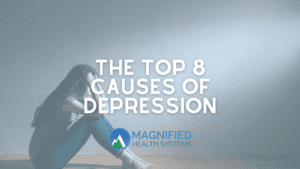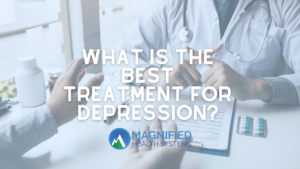Even with effective treatment, major depression does not always go away, and persistent or challenging-to-treat depression has been shown to add to the significant disease burden brought on by depression. Chronic, persistent, or treatment-resistant depression can all be referred to as difficult-to-treat depression under this umbrella phrase. The term “difficult-to-treat depression” and the words used to define it have not been widely accepted for use in clinical practice or research. Depression that is resistant to treatment might have several causes. It most likely depends on a variety of things for most people. Some of them, like the genes you were born with, are outside of your control. Some things are under your control.
Treatment resistant depression is one that is not responding to the regular regime of treatment. You could have treatment-resistant depression if you’ve received treatment for depression but your symptoms haven’t subsided. Most people find relief from the symptoms of depression by taking an antidepressant or attending psychotherapy. Standard therapies, however, fall short in the case of treatment-resistant depression. Your symptoms could get better but then keep coming back, or they could not help at all.
Depression that resists treatment is a challenging disorder to manage. A proper medication schedule, length of treatment, severity of side effects, suicidal thoughts and attempts, non-suicidal self-injurious behaviors, intolerance issues, better treatment options, lifestyle changes, costs and insurance coverage, interactive sharing of inner experiences with the treating expert, and freedom to ask any questions are all essential for patients with the disorder.
Regrettably, there are times when depression treatments fail. The first antidepressant that a person with depression tries may not be effective for as many as two-thirds of them. After numerous treatment attempts, up to a third of patients do not progress. It normally takes four to eight weeks for antidepressants and other depression treatments to start working fully and for side effects to start fading. It takes considerably longer for other folks. Tragically, a lot of people—and occasionally even doctors—give up on a drug too soon, before it has a chance to be of assistance. Up to 15% of patients don’t respond to antidepressants, while 40% only experience partial improvement.
The effectiveness of conventional depression treatment methods has been investigated in a number of large-scale clinical trials. Pseudo-resistance is one of the risks associated with diagnosing TRD. Pseudo-resistance may include the profile of patients who have received suboptimal AD dosages or had their medications discontinued early for a variety of causes, including as unpleasant side effects, patient non-adherence, or underdosing. Additionally, comorbidities like personality disorders, substance use disorders, or anxiety disorders may confuse the clinical picture and negatively impact how well a patient responds to treatment. Several treatment modalities included: traditional pharmacology approaches, brain stimulation, and Ketamine therapy.
It can be difficult to support someone who is depressed. You can feel helpless and unsure of what to do if you know someone who is depressed. Learn how to offer support and understanding and how to help your loved one get the resources to cope with depression. The options include:
Despite the seemingly insurmountable mountain of depression, not all hope is lost. At Magnified, we walk with the patient all throughout their treatment. We strive to develop a deeper comprehension of the patient to be able to manage his/her treatment process. At Magnified Health Systems, our objective is to support your mental health. If you haven’t had luck with your other depression treatments, let’s talk.
Get confidential help 24/7. Call now for:
Related Articles
Get Help Now
Medical Advice Disclaimer
Magnified Health Systems aims to improve the quality of life for people struggling with substance use or mental health disorder with fact-based content about the nature of behavioral health conditions, treatment options and their related outcomes. We publish material that is researched, cited, edited and reviewed by licensed medical professionals. The information we provide is not intended to be a substitute for professional medical advice, diagnosis or treatment. It should not be used in place of the advice of your physician or other qualified healthcare providers.

Dr. Bickley graduated from U.C. Irvine with honors: Phi Beta Kappa, Golden Key International Honor Society, Cum Laude. He has been featured on national radio and print media. He is also a frequent lecturer at National Conferences. He holds an A.S. degree in Drug & Alcohol Studies, and two B.A. degrees in Criminology & Psychology, and masters and doctoral degree in Clinical Psychology. He is a licensed California Drug & Alcohol Counselor Level II, a licensed Clinical Supervisor and is certified in treating Eating Disorders.

Have you ever pondered the root reasons for clinical depression? Perhaps a significant depression diagnosis has led you to wonder why some people experience depression while others do not. Depression is a complicated scenario. Although there are many potential causes, no one is certain of their actual cause.

The best treatment for depression is one that considers each person’s specific needs. Although that may sound obvious, people with depression struggle in different ways and can benefit from multiple forms of therapy.
Call Us Now, Our Admissions Team Is Standing By And Available 24/7.

Head Office Location:
1530 N Federal Hwy Lake Worth, FL 33460
Contact & Feedback:

We are here for you.
We are here for you, Call us and get started!
